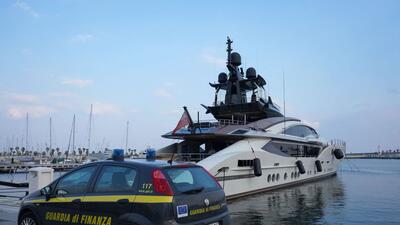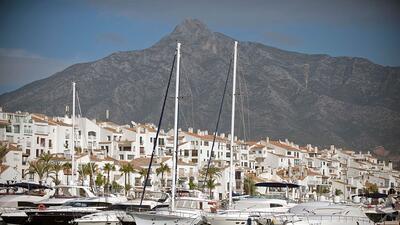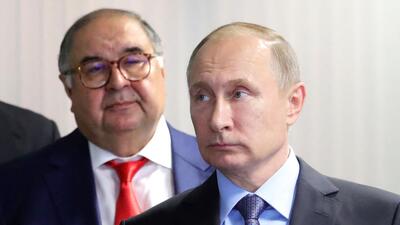The party may be over for Russian oligarchs, but will sanctions work?

This week's U.S. and European sanctions against Russia appeared to catch some sanctioned oligarchs by surprise.
A few were too slow to move their superyachts from European ports and were even more shocked to find their debit cards no longer function, forced to rely on cash from safes, the BBC reported.
Italian police seized villas and yachts worth $156 million from five high-profile Russians who were placed on sanctions lists following Moscow's attack on Ukraine, the government said on Saturday.
As it was prepared to sail away, French authorities also seized another $600 million super yacht, the Amore Vero ("True Love"), owned by Igor Sechin, boss of Russian state energy company Rosneft.

A Ukrainian mechanic admitted in court last week to trying to sink a superyacht, called Lady Anastasia, in Majorca, off the eastern coast of Spain, belonging to a Russian weapons exporter.
To be sure, others were more fortunate, quietly upping anchor and slipping away bound for safer harbor in the Black Sea or the Baltic.
Making Putin feel the pain
Western leaders hope that by cutting the Russian economy off from the global financial system, they can create economic pain for Putin at home, while also stripping the oligarchs of their trans-Atlantic assets in the world’s playgrounds of the rich, from the French Riviera to Miami.
“Today, Russia appears to be on the verge of an economic collapse without parallel in its post-World War II history,” said Maximilian Hess, a political risk consultant based in London and a fellow at the Foreign Policy Research Institute.
“The U.S. and E.U. decision to sanction Russia’s central bank has essentially severed the spinal cord of the country’s economy. Russia is set to default on its debts … its currency collapse even further, and it is now possible that most of its residents’ quality of life may fall to Iranian or potentially even Venezuelan standards in the near future,” he added.
But questions swirl over how effective sanctions can be in forcing Putin to back down and withdraw his forces from Ukraine. The outlaw regimes of Iran and Venezuela – as well as Cuba and North Korea - have all been hit by devastating sanctions, yet remain in power – more than 50 years later in Cuba’s case.
Putin has spent the last few years preparing for sanctions, building a war chest of foreign reserves at the Central Bank of $600 billion in bonds, gold and cash, that some have dubbed ‘fortress Russia.”
But Russia is especially vulnerable to sanctions due to its dependence on its oil and gas exports. Initially, at least, the U.S. and Europe have been wary of sanctioning Russia’s oil and gas sector due to the effect it would have on global energy prices, especially in Europe which depends on Russia for 40% of its energy needs.
Indeed, experts say some of the hurt from the sanctions will likely end up being felt at home, in the United States and Europe, where inflation, higher energy prices and lower stock prices are already eating away at salaries and savings. While the potential for a boomerang effect exists, it may simply be the inescapable price the world must pay to beat down Putin, and infinitely more preferable than a full-blown nuclear war.
Russia and Ukraine and major breadbaskets in terms of grain production, while some of the oligarchs are heavily invested in metals, such as aluminum. Ukraine and Russia account for 60% of global production of sunflower oil, and 30% of global wheat exports, according to commodity experts.
“The outbreak of a fully-fledged Russia-Western economic war means that turmoil in agricultural, metals and hydrocarbons markets is here to stay,” said Hess. “However, given the Kremlin’s unilateral aggression, there is no alternative,” he added.
US and Europe go after Russian ‘kleptocrats’
The U.S. Department of Justice this week announced the creation of a ‘KleptoCapture’ task force to investigate and prosecute Russian oligarchs who try to evade sanctions. The U.K. also said it had established an Oligarch Taskforce to co-ordinate its sanctions.
France is also drawing up a list of property owned by ultra-rich Russians including bank accounts, luxury cars, yachts and holiday homes on the Mediterranean coast.
For decades, Russia’s ultrarich have flaunted their wealth in the world's most fashionable cities, snapping up luxury mansions, sending children to top private schools and parking their money in global financial hubs – out of the reach of tax authorities – as well as Vladimir Putin.
That could have an impact on banks in major financial hubs like New York, London, and Switzerland, as well as winter and summer resorts, from Colorado to the Mediterranean.
In 2017, U.S. and French economists at the National Bureau of Economic Research estimated that Russia’s elite had roughly $800 billion in offshore accounts.
Transparency International UK, a group that campaigns against corruption, says $2 billion worth of property has been bought in Britain in just the last five years by Russians who are accused of corruption or have links to the Kremlin.
Last week, the U.K. shut down its investor visa program that had proven popular with wealthy Russians as a way to get residency in the country. A similar E.U. program has issued 431 visas to Russian citizens.
Hundreds more EB-5 investor visas have been granted to Russians in the U.S., in return for investing at least $500,000 in so-called targeted employment areas.
South Florida, has also long been popular with Russians, including organized crime members, with Miami Beach apartments advertised in the Aeroflot inflight magazine. A Ukrainian mobster, Ludwig Feinberg, known as ‘Tarzan’, notoriously once attempted to sell a Soviet-era submarine to Colombian drug traffickers for $35 million in a deal negotiated at a strip club named Porky’s by Miami International Airport.
Property owners have included Dmitry Rybolovlev, a billionaire Russian potash fertilizer producer and majority owner of Monaco soccer club, who famously bought a Palm Beach mansion from Donald Trump in 2008 for $60 million more than its asking price just a few years earlier. Rybolovlev and his daughter also own a 10-bedroom apartment next to Central Park in New York purchased in 2011 for $88 million, a home in Hawaii and an island in Greece.

In 2017, a Reuters review found at least 63 people with Russian passports or addresses had bought at least $98.4 million of property in seven Trump-branded luxury towers in southern Florida. It found that at least 703 of the owners of the 2,044 units in the seven Trump buildings, or about one-third, were limited liability companies, or LLCs, which can mask the identities of properties’ true owners.

Costa del Sol became a favorite playground for rich Russians
To relax, Russian have also flocked in recent years to the south of Spain. In the not-so-far removed from real life TV series La Reina del Sur, Mexican drug trafficker Teresa Mendoza teams up with a Russian mobster, Oleg Yosokov, in Malaga, in southern Spain’s Costa del Sol.
The Costa del Crime, as it is also known, has become a favorite spot for Russians, who can walk off their yachts in Puerto Banús, just east of Marbella, straight into the latest hot discotheque.
According to Spain’s National Institute of Statistics, last year 7,379 Russians were registered as living in Malaga province, of whom about 2,800 were in Marbella, according to Sur, an online news site.
The Russian elite’s super yachts and private jets, have drawn public scrutiny in the wake of the country’s invasion of Ukraine last week.

According to Reuters, at least five superyachts belonging to Russian billionaires are anchored in or sailing around the Maldives in the Indian Ocean, benefiting from the fact that the Maldives has no extradition treaty with the United States.
Another yacht, named Tango, also anchored in Majorca, belongs to Viktor Vekselberg, Russia’s seventh-richest person, with a fortune of $16.9 billion, according to the Bloomberg Billionaires Index. Vekselberg is the part owner of Russia’s biggest aluminum company, United Co. Rusal.
Spain hosts several other Russian yachts, including the 461-foot Solaris belonging to Roman Abramovich, the owner of Chelsea FC, which was completed last year at an estimated cost of $600 million, according to the website Superyacht Fan.

Abramovich, this week announced he is giving up ownership of Chelsea, the current UEFA champions.
US sanctions a string of Russian oligarchs
Dmitry Peskov, Putin's press secretary, is among his alleged “cronies” targeted by the White House in the latest round of sanctions on Thursday.
Peskov, 54, joined a list of eight oligarchs and nearly two dozen of their family members and associates whose assets in the U.S. will be frozen. Another 19 oligarchs - including Putin ally Alisher Burhanovich - and 47 of their family members face U.S. visa restrictions.

The UK has announced sanctions on two more Russian oligarchs - Alisher Usmanov and Igor Shuvalov following Russia's invasion of Ukraine.
Shuvalov was Putin’s deputy prime minister and is currently chairman of a bank and owns two luxury apartments in central London worth an estimated $15 million, according to the British government.
Usmanov founded USM Holding company, an investment group that owns iron, steel and copper suppliers and a telecommunications company. Usmanov's company USM also had sponsorship ties with British soccer club, Everton, which were severed this week.
At Everton’s most recent game on Thursday evening, the team’s players walked out draped in Ukrainian flags, behind 22-year-old Ukrainian defender Vitaliy Mykolenko who was made captain for the night on just his fourth appearance for the club.

Usmanov owns a house in a wealthy district of London, worth an estimated $64 million, and the 16th century estate in the countryside outside London, once owned by American oil magnate John Paul Getty, and the world’s richest man in his day.
But blacklisting individuals can only go so far due to the murky world of offshore finance.
As highlighted by three recent leaks of offshore banking documents - the Panama Papers, the Paradise Papers and the Pandora Papers – financial experts say governments will need to take tougher measures to tackle opaque banking practices, such as ‘blind trusts’ that oligarchs use to hide their assets.
“Actions to sanction those associated with the Russian regime have brought policymakers to a stark realization: existing standards and regulations are entirely unfit for purpose when it comes to addressing the threats of anonymous wealth,” according to the Tax Justice Network which advocates for reforms to prevent the super-rich and corporate giants evading taxes.
A Financial Secrecy Index published by the Tax Justice Network, listed the Cayman Islands as the place that offers the most financial secrecy, followed by the United States, Switzerland and Hong Kong.
Suspicious Russian money flowed into London in recent years
Critics of the British government say London’s financial center has long lacked oversight by authorities, allowing wealthy Russians to use it as a safe place to store money while also invest in other parts of world.
Suspiciously large amounts of Russian money began passing through the city in the 1990s, according to a 2018 report to the British parliament. “The use of London as a base for the corrupt assets of Kremlin-connected individuals is now clearly linked to a wider Russian strategy and has implications for our national security,” a parliamentary committee wrote.
“What we offer them is a haven: not just a tax haven, but an everything haven,” Russia expert, Oliver Bullough, wrote in a blog post this week titled ‘Britain is Putin’s playground.’
Hess, who lives in London, agrees that sanctions are necessary to rein in Putin. But he warns that economic sanctions stemming from the invasion of Ukraine, could also lead to a wider economic conflict if not matched by increased diplomatic efforts.
That includes defaulting on payments to foreign lenders as well as oil, gas and fertilizer cut offs.
“The Russians have made it quite clear that they plan to retaliate economically. They have been building for their own geo-economic tools,” he said.
No comments:
Post a Comment